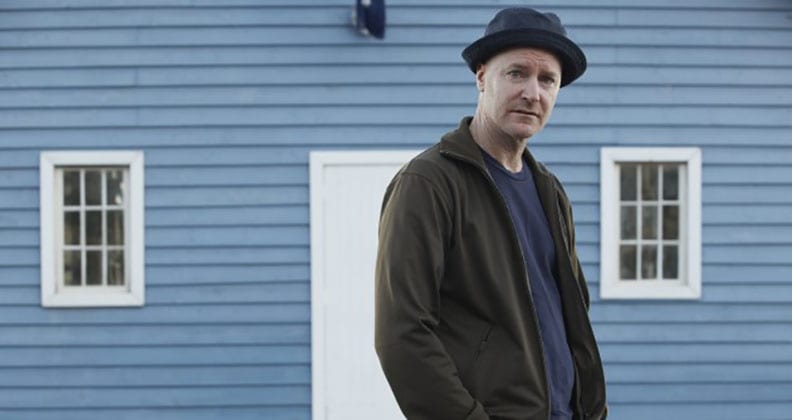We speak to Western Australian author and Curtin Senior Lecturer David Whish-Wilson about his award-winning short story The Cook, crime writing, Breaking Bad and Australia’s surprising link to colonial California. Set in Western Australia, The Cook follows an ex-methamphetamine chemist as he struggles to escape a violent past and face up to fatherhood.
Where did you get the idea for The Cook?
One of the things I like about writing is not knowing where a story is going or what the story will become. I pretty much start with a character or a setting. There’s a place I go camping where most of The Cook is set, up at Cue – a place called Walga Rock. I try and go camping there every year. I knew I wanted to set part of the story there because I haven’t seen much fiction set in that Gascoygne country. So I had a character and I had a setting and I just played around with it.
How important to you is place, and knowing a place, for a story?
For me, it’s vitally important. It’s the old fiction cliché that a setting should be as vivid and as present as a character; it should almost be its own character in the story. I try to emphasise that when I write fiction set in Western Australia because there isn’t a lot of fiction set here. I’m aware that many readers haven’t got a stock of images or knowledge about Western Australia to draw upon.
[It’s different] if you set a novel in New York City, where everyone has a set of images to work with, whether or not they’ve been there. That’s not necessarily the case here. In fact, I don’t know any fiction that’s set in that particular part of Western Australia [the Gascoygne]. For that reason, I wanted to be reasonably specific about the names of things and the quality of the light and the geology. Getting the general sense of a place, for me, is very important.
Is that a freeing experience, to write about something that hasn’t been written about so much, as an author? It’s pioneering, in a way…
Perhaps. All writing is a freeing experience. It just means that you have to pay a little bit more attention to the details rather than if you’re setting a story in a place that everybody knows.
You’ve written crime before. What first drew you to crime writing?
I’ve always been a crime reader, but for my first crime novel called Line of Sight, I was writing about the murder of [Perth brothel madam] Shirley Finn [in 1975], and most of the people I spoke to were ex-policemen, ex-criminals, ex-prostitutes. It centered upon a criminal act, a violent murder. It became pretty clear that the best structure to build around that story would be a crime fiction story and I wanted to teach myself a little bit about [how to develop that] structure.
I generally write from character and let the story go where it will. But one of the good things about crime fiction – when it’s good crime fiction – is you get all the vividness of character and good descriptive writing, but the structure is such that you can work with your readers’ expectations. It provides not necessarily a formula but some kind of map; you’re aware that your readers are looking for certain things that can tell you a story within that broad structure.
What differences have you found between researching for your fiction and nonfiction stories?
The research is the same. I just cram my head with everything I need to know until I almost can’t take it anymore, and then I start writing. The difference with nonfiction is: there’s a contract between you and your reader that what you’re saying is factually based and the quotations you’ve used are factually based. It’s much more freeing writing fiction. It might still be factually based but the contract is different with a reader.
The primary purpose is to tell a story. I find writing nonfiction more onerous because of the responsibility towards telling the truth as it is described by your interviewees and the texts you’re using. But there are still pleasures to be had in writing creative nonfiction, that’s for sure. It’s just a different form; it requires a different voice.
To me, creative nonfiction is a more literary voice. You don’t have the time [to flesh out a story like you would in a novel]. For example, Perth is a very small book: it’s only 50,000 words. Creative nonfiction was the perfect form to capture the sense of Perth as a place and what it feels like to live here – its specific history and architecture and art and landscape. Because rather than exploring things in great breadth, you take a kind of impressionistic approach. You’re choosing certain details, which hopefully stand in for all the things you can’t say. It’s more similar to the short story form. You’re hoping there’s a certain amount of compression and a large amount of suggestion.
What kind of research did you do for The Cook?
Without going too much into it, I know people like [the characters featured in The Cook]. I lived a reasonably interesting life as a younger man. As a writer anywhere, really, it’s just about keeping an ear out for good stories, and to me these people are interesting because they are a little bit outside the law, and may or may not have their own kind of code.
What’s interesting about crime and crime fiction is this idea that, behind the charades, there is stuff really going on that people tend to turn away from. And that whole idea of looking behind the façade or the truths we tell ourselves, and exploring characters who know what’s really going on because it’s not in their interests to be known is really interesting to me.
Methamphetamine seems to be everywhere at the moment. It’s on every second front page of the newspaper.
Yeah, it wasn’t when I wrote that story, funnily enough. I guess it’s an intergenerational thing. When I was younger, at the age of the son in this story, heroin was cheap and you could get it anywhere. And lots of people I knew were into it. It’s just a different generation now. I guess that’s the father and the son, spanning those two different generations.
So it’s not so much that society’s changed or more people are using drugs, but that it’s just a different drug?
I think it’s just a different drug, yeah. There have always been high-functioning heroin users since the drug was invented, but that’s probably less the case [with methamphetamine]. You look at the way certain drugs suit certain aspects of society: [for example, some people] take meth or speed to achieve more at work. So it fits in with our busy society where people are working and you need to do a certain amount before you can knock off and relax.
I wasn’t going to bring up Breaking Bad, but I can’t resist… What do you think its impact has been?
It’s a very good series. Breaking Bad talks about the violent criminal background [of illegal drugs] and the way organised crime works through fear and intimidation, but also it’s about ordinary people taking recreational drugs.
I think it’s honest in its representation. On one level it’s just great entertainment and it’s a series that’s all about structure. It’s about suspense and turning points in each episode. But at least it portrays the whole thing reasonably honestly: the idea that there’s the narrative about drugs destroying people’s lives, but on the other side a lot of people take drugs and live perfectly normal lives. To me, you can’t have one truth without the other.
How do you think the crime genre has changed over time, if at all?
I don’t think it has changed as a genre. I think what has changed is its reception, and that has to do with areas of study like cultural studies. That binary between high culture and low culture has pretty much dissolved. It’s taken a while for that to happen in terms of newspaper reviews and what have you, but now it’s just accepted that good writing is good writing and bad writing is bad writing. And because of series like Breaking Bad and The Wire and so many others, it’s accepted that some of our best writers are crime fiction writers. Guys like Richard Price and so many others are telling interesting stories about contemporary life. It just happens to be in the crime fiction genre.
All of the strengths that we associate with other forms, such as quality writing and great characterisation are all there, so I think the way crime fiction is received has probably changed. There have always been great crime fiction writers: it’s just that they were writing at the margins in a kind of niche, unappreciated form. That’s changed and now it’s much more accepted.
It seems people have always been fascinated by crime, throughout history, and will probably always continue to be fascinated with crime.
Yeah, that whole idea of human deviance is interesting to people.
What is your own creative process? What kinds of things do you do to help you write?
I’ve been doing it long enough now that I don’t worry about any of that. I live a pretty busy life: I work full-time, I’ve got three kids and I’m asked to do a lot of small writing gigs for people. So when I do get time, I just sit down and write. I’ve been doing it for a couple of decades now, so I just trust that when I sit down the ideas will be there, and so far that seems to be the case. I just try to carve out time for myself. Basically I’m too busy; I don’t have time to worry or have any anxiety about writers block. I don’t have time to procrastinate. I just have to do it.
Pressure is definitely a great motivator.
Yeah, I just wouldn’t get anything done if I wasn’t like that. It’s not necessarily the best [method]. I’m aware that I’d be a lot more productive if I had a lot more time to write. There’s nothing like writing every day. You go deeper into a story. But that’s just a luxury I haven’t got at the moment.
Have you got an idea for your next major piece of writing?
I’ve got another crime novel with a publisher at the moment. And I’m working on another novel at the moment. I’m about half way through it. It’s set in San Francisco in 1849. So that’s a completely different kind of research. That’s going to involve going there [to California], looking in the state library, doing a lot of interviews and that kind of thing. It’s a little known fact that California’s first crime gangs were mostly Australians – ex-convicts – who left when the gold rush started in California in 1849.
They ran San Francisco for a couple of years. So I’m writing about that background, that whole idea of the convict diaspora. Afterwards, lots of them came back to Australia when the Australian gold rush started. But a lot of them stayed.
At the time when I am setting my story, in 1849, San Fransisco had a population of about 30,000, and somewhere up to about 15,000 of them were Australian. So there’s a strong and I think unacknowledged Australian background to California’s history. Largely because they [the convicts] were despised because they were thought to be violent and criminal in the same way that Italian crime gangs have been critiqued and marginalised.
Where did you find out about the Australian-Californian connection?
Again it was just something that was told to me by a friend. He said: “Do you know about this?” And I hadn’t. So I just started researching and playing around with characters.
When you’re writing something, do you tend to talk to other people about what you’re writing about?
Not really, no. I don’t know any writers who do that. It’s good if you’ve got a group of friends that you can trust and you’re work-shopping stuff. I tell people about the story as I’ve just described it to you, but it’s all so intangible and delicate. Lots of writers will tell you a manuscript is a house of cards until you’ve actually got it ready to show someone.
There’s the sense that it can all collapse around your ears, and sometimes it does, so for superstitious reasons I guess I don’t talk about it much in terms of characters. But I’m also not quite clear in that first draft about who is who, and what is what, and where it’s going.
Do you get frustrated when you write?
I probably get frustrated more by the lack of time than what I’m writing about. Thus far, no, I don’t get frustrated. I kind of treasure the time that I get to do it.
The words come out naturally enough?
For the most part. But again, I’ve been doing it long enough that when it doesn’t work, it’s no reason to throw my hands up in the air. It just means you try a different approach. You come back to that passage which is poorly written.
The best thing about a first draft is you know you’re going to make mistakes; you know it’s going to be flawed. It’s just part of writing a first draft. And so rather than becoming frustrated about it when things aren’t going your way, you just accept it’s going to be like that and trust yourself to come back and fix it up in the next draft. That is quite freeing. It’s always a bit of a balancing act.
For me, writing is all about anxiety and energy. Getting the balance right between the anxiety of not writing and the anxiety of writing. Still, every morning when I sit down, I feel quite anxious about whether or not there’s going to be anything interesting. But the anxiety of not writing is stronger than the anxiety of writing, so that pushes me forward.
Anxiety’s not necessarily a bad thing. It is a kind of fuel, though it can be paralysing. I know friends where it becomes too much [for them]. You’ve just got to find ways to manage it. For some people it’s drinking, for some people it’s exercise. Everybody’s got a different approach.
How do you think you’ve changed as a writer from when you were younger?
When I was younger, I didn’t take it seriously. I worked; I did different jobs. Writing was just a strange little habit. And I didn’t know another writer. I didn’t meet another person interested in writing until I was about 27. It was just something I always did that no one else did. Even though lots of my friends were actors and musicians, I didn’t know anybody else who was doing any writing. As a result, I didn’t take it too seriously, whereas now I just think of it as my job.
What were you writing back then?
I was only writing short stories in those days. I was lucky because [when] I was living in Japan and wrote stories about [when I lived in] Africa, there were a couple of Australian short story journal writers who were encouraging me. That’s another thing that kept me going. If those early short story publishers hadn’t encouraged me, I probably wouldn’t have kept on. I just enjoyed reading, which is quite a primary pleasure.
What do you tell students who are struggling with their writing?
For me, writing’s a craft. There’s an art to it, but it’s a craft, and you learn by doing. You don’t expect a carpenter to make a perfect table the first time without having learnt how to sand and plain and all of those kinds of things. Even though you’re first works might not be very strong, you learn where your strengths lie and where your weaknesses lie. So you work to your strengths while trying to improve the things you’re not good at. That might be dialogue, but in my case it was structure. Opening yourself up to good influences [is beneficial].
Reading is, of course, the best way [to improve your writing]. As many creative writing teachers will tell you, one thing that’s often remarked on in the last 20 years is that many writing students want to be writers but don’t want to read. You wouldn’t expect a musician not to listen to music or practice. You wouldn’t say: “I’m going to be a fantastic guitar player and never listen to [any guitar music].” If you’re not reading and absorbing influences in your own way, you can’t really say that equivalent about writing.
It’s a case where most people can put pen to paper and so everyone thinks they can be a writer.
It’s certainly the case where the more you do it, the better you get. As long as you’re open to your own faults and you’re open to influences. Reading’s vitally important and there’s nothing wrong with a bit of imitation. When you find a writer that you really like, reading their work – even reading their work just before you start writing – will allow you to channel their rhythms and attention to detail.
I think there’s a lot of pressure as a new writer to be original and come up with your own ideas. The idea of copying or imitating someone’s style can be challenging.
But really, all writers do it. It’s about finding writers that you admire and looking at their work to see what they’re doing right – and what you might not be doing right. To do rhythm and syntax right [is difficult]. Not every writer has the facility for figurative language and metaphor. Not every writer writes good dialogue, so if that’s the case, you find ways to improve it. If you’re not able to, find ways to structure your story so you don’t have big long dialogue passages.
How important is the relationship with an editor for you?
Very. At my last publisher, Penguin, I was lucky enough to have a really good editor. She taught me a lot. It always helps to have a fresh pair of eyes, but it’s a very unusual relationship because it’s dependent on trust. If you have an editor who you completely trust, it’s a priceless lesson. Definitely having a fresh pair of eyes is important.
What are you reading at the moment?
I’m reading a book called Sydney Bridge Upside Down by a New Zealand writer [David Ballantyne]. And I’m re-reading Cormack McCarthy’s Blood Meridian – and about ten other books.



